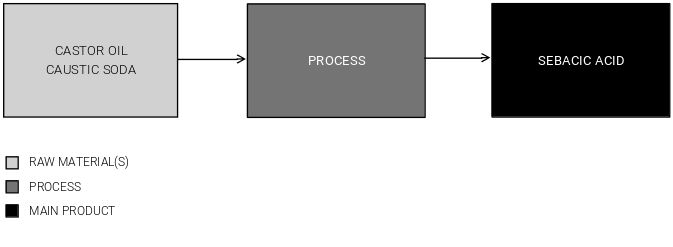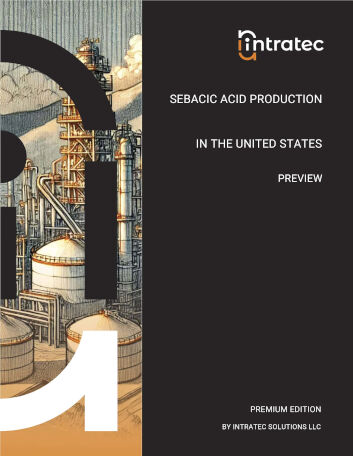Commodity Production Costs Report
Sebacic Acid Production
Sebacic Acid Plant Capital & Operating Cost Analysis | United States | Q4 2025
This report presents the economics of Sebacic Acid production from castor oil and sodium hydroxide. The process examined is a typical caustic oxidation process. Initially, castor oil is submitted to alkaline cleavage with sodium hydroxide, forming sodium sebacate. Then, the medium is acidulated in order to precipitate sebacic acid.
The report provides a comprehensive study of Sebacic Acid production and related Sebacic Acid production cost, covering three key aspects: a complete description of the Sebacic Acid production process examined; an in-depth analysis of the related Sebacic Acid plant capital cost (Capex); and an evaluation of the respective Sebacic Acid plant operating costs (Opex).
The Sebacic Acid production process description includes a block flow diagram (BFD), an overview of the industrial site installations, detailing both the process unit and the necessary infrastructure, process consumption figures and comprehensive process flow diagrams (PFD). The Sebacic Acid plant capital cost analysis breaks down the Capex by plant cost (i.e., ISBL, OSBL and Contingency); owner's cost; working capital; and costs incurred during industrial plant commissioning and start-up. The Sebacic Acid plant operating costs analysis covers operating expenses, including variable costs like raw materials and utilities, and fixed costs such as maintenance, labor, and depreciation.

Product
Sebacic Acid. Sebacic Acid is a dicarboxylic acid used as a monomer for nylon 6, plasticizers, hydraulic fluids, lubricants, cosmetics, candles, and others. It also has a role as a human metabolite, and is used as an intermediate for aromatics, antiseptics, and painting materials. Sebacic acid is a derivative of castor oil. It appears as a white granular powder.
Raw Materials
Caustic Soda. Causic soda (NaOH), also known as sodium hydroxide, is a major inorganic used in several industries. Most of caustic soda production is used in the manufacture of chemicals, such as propylene oxide and sodium salts. Electrolysis of sodium chloride accounts for most of today’s installed capacity for caustic soda production, which also generates chlorine.
Castor Oil. Castor oil is a vegetable oil used in lubricants, coatings, and as a raw material for biodiesel and polymers. It contains ricinoleic acid, which imparts unique chemical properties. Extracted from castor beans, it is stored as a viscous liquid. Its hydroxyl functionality allows for the synthesis of polyurethanes and other specialized materials.
Report in PDF Format
Download & Explore Anytime
Access in Various Devices
Print & Read Comfortably
Share With Co-workers
Up-to-date Report
Professional report based on Q4 2025 economic data, ensuring timely evaluations.
Multiple Use Cases
Ideal for investment screening, feasibility studies, cost estimates, and research planning.
Proven Methodology
Developed using a consistent methodology honed over a decade, ensuring reliable cost analyses.
Report Editions
Content Highlights
Plant Capital Cost Summary
Summary outlining the capital cost required for building the Sebacic Acid production plant examined.
Plant Capital Cost Details
Detailing of fixed capital (ISBL, OSBL & Owner’s Cost), working capital and additional capital requirements.
Plant Cost Breakdowns
Breakdown of Sebacic Acid process unit (ISBL) costs and infrastructure (OSBL) costs; plant cost breakdown per discipline.
Operating Costs Summary
Summary presenting the operating variable costs and the total operating cost of the Sebacic Acid production plant studied.
Operating Cost Details
Detailing of utilities costs, operating fixed costs and depreciation.
Plant Capacity Assessment
Comparative analysis of capital investment and operating costs for different Sebacic Acid plant capacities.
Production Process Information
Block Flow Diagram, descriptions of process unit (ISBL) and site infrastructure (OSBL).
Process Consumptions
Raw materials and utilities consumption figures, by-products credits, labor requirements
Process Diagrams
Process flow diagrams (PFD), equipment list and industrial site configuration
Could Not Find the Report You Need?
Obtain a Bespoke Report
Get a report targeting the process in which you are interested
See Offer Details
Understand Bespoke Reports and how you can easily order them
Check Editions & Pricing
Complete a brief form and see a quotation for your Bespoke Report
Other Related Production Cost Reports

Sodium Hydroxide Production from Sodium Chloride (Diaphragm Process)
It presents the economics of Sodium Hydroxide production from brine in the United States. The process examined in this report is a typical diaphragm process. Chlorine and hydrogen are also generated as by-products in the process.
Details: 600 kta United States-based plant | Q4 2025 | 107 pages | Issue B | From $799 USD

Sodium Hydroxide Production from Sodium Chloride (Membrane Process)
This report presents the economics of Sodium Hydroxide production from sodium chloride in the United States, via a typical membrane process. In this process, sodium chloride is decomposed electrolytically, producing sodium hydroxide. Chlorine and hydrogen are generated as by-products in the process.
Details: 550 kta United States-based plant | Q4 2025 | 107 pages | Issue A | From $799 USD
+800 Reports Developed, Targeting +250 Commodities
Vast Report Library
858 independent and up-to-date reports examining embryonic and established production processes.
Free Sample Reports
Quickly understand the structure and depth of content of our professional reports.

